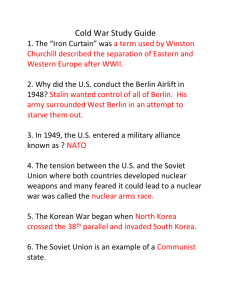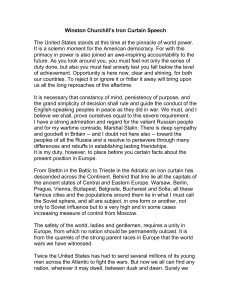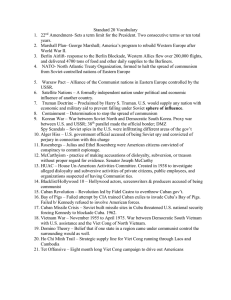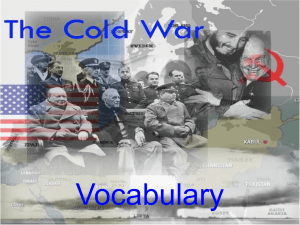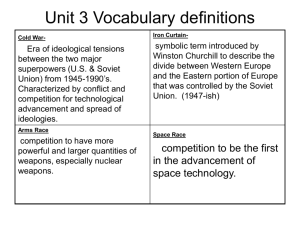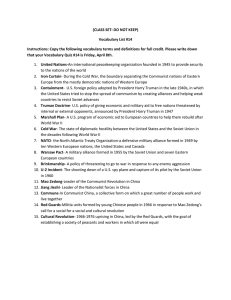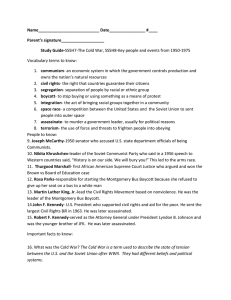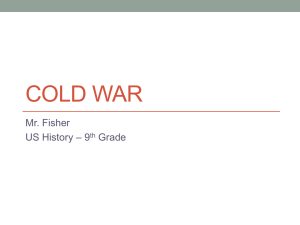Formation of Government Throughout History
advertisement
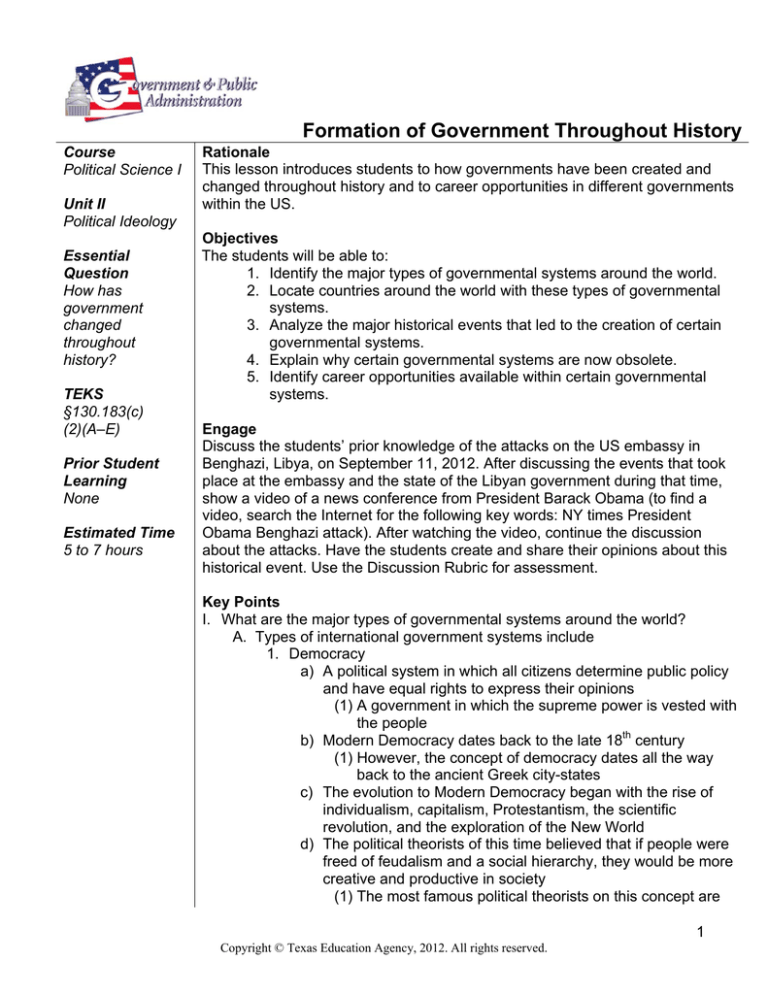
Formation of Government Throughout History Course Political Science I Unit II Political Ideology Essential Question How has government changed throughout history? TEKS §130.183(c) (2)(A–E) Prior Student Learning None Estimated Time 5 to 7 hours Rationale This lesson introduces students to how governments have been created and changed throughout history and to career opportunities in different governments within the US. Objectives The students will be able to: 1. Identify the major types of governmental systems around the world. 2. Locate countries around the world with these types of governmental systems. 3. Analyze the major historical events that led to the creation of certain governmental systems. 4. Explain why certain governmental systems are now obsolete. 5. Identify career opportunities available within certain governmental systems. Engage Discuss the students’ prior knowledge of the attacks on the US embassy in Benghazi, Libya, on September 11, 2012. After discussing the events that took place at the embassy and the state of the Libyan government during that time, show a video of a news conference from President Barack Obama (to find a video, search the Internet for the following key words: NY times President Obama Benghazi attack). After watching the video, continue the discussion about the attacks. Have the students create and share their opinions about this historical event. Use the Discussion Rubric for assessment. Key Points I. What are the major types of governmental systems around the world? A. Types of international government systems include 1. Democracy a) A political system in which all citizens determine public policy and have equal rights to express their opinions (1) A government in which the supreme power is vested with the people b) Modern Democracy dates back to the late 18th century (1) However, the concept of democracy dates all the way back to the ancient Greek city-states c) The evolution to Modern Democracy began with the rise of individualism, capitalism, Protestantism, the scientific revolution, and the exploration of the New World d) The political theorists of this time believed that if people were freed of feudalism and a social hierarchy, they would be more creative and productive in society (1) The most famous political theorists on this concept are 1 Copyright © Texas Education Agency, 2012. All rights reserved. Thomas Hobbes and John Locke e) When the Industrial Revolution occurred in the US, like in many other developed countries, it ushered in a new relationship between government and economy, which is still relevant today f) Laissez-Faire Theory in democracy means that the government will stay out of all economic life g) In a democracy, there is a capitalist type of economy, which means that all means of production are privately owned and prices, wages, and profits are determined by private industry 2. Theocracy a) A political system in which the officials are considered to be divinely guided, or directed by God b) Government officials are also considered members of the clergy c) Most governments throughout history have had characteristics of theocracy (1) When King Henry VIII separated from the Roman Catholic Church in the 1500s, he create the Church of England in which he was considered the “Supreme Head of the Church of England” d) The only three theocratic forms of governments in the world are Iran, Saudi Arabia, and The Vatican (1) In 1979, Ayatollah Khomeini emerged as a leader in Iran for two main reasons (a) He developed the notion that senior clerics had the obligation and right to rule and maintain the Islamic nature of Iran (b) He became one of the leaders of the opposition to the secular regime of the Shah, the title for the head of government in Iran prior to 1979 e) No separation between church and state 3. Republic a) A political system in which the supreme power is vested with the people, but their vote rests with the representatives who are directly or indirectly elected b) Leaders are elected based on standards set forth by a constitution (1) There are no positions that are hereditary c) Also known as Representative Democracy d) This form of government made the Founding Fathers more comfortable when they were writing the Declaration of Independence and the US Constitution (1) They believed that allowing everyone to participate in government, would create a sort of mob rule and the uneducated would destroy the newly created US 2 Copyright © Texas Education Agency, 2012. All rights reserved. government (2) By using the term “republic,” they felt that people were going to be represented by the wealthy and more educated and they would be more responsible when it came to making decisions for the country e) For example, in the US, we vote for people to represent us on the federal level f) These representatives are also responsible for electing the president and vice president of the US; the representatives create what is called the electoral college 4. Monarchy a) A political system in which all of the nation’s power is held by one person (1) Historically most monarchies are based on a family’s lineage b) A monarchy form of government can be organized in several different ways (1) Absolute Monarchy – the monarch is the ultimate governing body of the state, and his or her powers are not limited by the Constitution or laws (2) Constitutional Monarchy (a) Recognizes the monarch as the head of state, and as the head of state the monarch is expected to govern within the laws of the country’s Constitution (b) The most common form of monarchy in the world (c) One of the most notable monarchies in the world is the constitutional monarchy of Great Britain (i) The current Queen of England is Queen Elizabeth II, who acts as the figurehead for the British government 5. Dictatorship a) A political system in which one person or a small group has absolute power without constitutional limitations b) The government typically has complete control over mass communications and the social and economic organizations c) Typically the dictator also believes in a certain ideology and how society should be organized d) There have been several dictators throughout history (1) Adolf Hitler (a) The dictator of Nazi Germany from 1934–1945 (b) The leader of the Third Reich, which believed in the concept of an “Aryan race” and the extermination of the Jewish population (2) Mao Zedong (a) The Chairman of the Communist Party of China from 1949–1976 3 Copyright © Texas Education Agency, 2012. All rights reserved. (b) Believed in China’s becoming a major world power and that it should be done through forced labor (c) Responsible for millions of deaths in China during his rule 6. Communism a) A political system in which the government controls all means of production b) Began as a social movement which was created to make society a classless, stateless, and moneyless state (1) Communists believe that by creating a classless state, there is no competition between the classes, and people can live in a full state of freedom (2) Although Communists believe in the concept of a “classless state,” government still controls all aspects of the economic and social organizations c) The most notable founder of the Communist form of government is Karl Marx d) The Soviet Union was considered to be a Communist state until it was eventually dissolved in 1991 7. Socialism a) A political system that believes the means of production and distribution lie with the community as a whole b) Similar to Communism in the sense that social problems occur when citizens are allowed private ownership of land and business within the economy c) Mainly refers to the organization of a country’s economy d) Unequal social status fails to give everyone an equal opportunity to maximize his or her potential e) For example, in the US, the Affordable Care Act, which is often referred to as “Obamacare” is considered by some to be a socialist form of healthcare II. What countries around the world have these different types of governmental systems? A. Asia 1. North Korea (The Democratic People’s Republic of Korea) a) A dictatorship form of government b) The dictator Kim-Jong-Un (1) The son of former dictator Kim-Jong-Il c) Shares a border with the countries of China and Russia d) Shares the territory known as the Korean Peninsula with the country of South Korea (1) South Korea is a democratic country, which causes conflict between the countries of North and South Korea e) One of the most restricted economies in the world which is controlled entirely by the central government 4 Copyright © Texas Education Agency, 2012. All rights reserved. 2. China (The People’s Republic of China) a) A communist form of government (1) However, China has been transitioning from a restricted and centrally planned economy to more of a market economy since 1979 b) One of the largest countries in Asia (landwise); also has the largest population in the world c) Shares a border with two other Communist/Dictatorial countries: North Korea and Vietnam (1) China also shares a border with two other major world countries: India and Russia 3. India a) A federal republic form of government, like the US (1) Government is based on a constitution (2) Considered to be the world’s largest democracy b) The second largest population in the world c) Shares a border with the Muslim country of Pakistan (1) Since India is a predominately Hindu country, the shared border with Pakistan often causes conflict between the two countries d) Surrounded on two sides by the Indian Ocean B. Europe 1. United Kingdom a) Consists of several different countries which include Great Britain, Ireland, Scotland, and Wales b) A constitutional monarchy form of government (1) The Chief of State = Queen Elizabeth II (figurehead) (2) The Head of Government = David Cameron (Prime Minister) (3) The Cabinet = Parliament (House of Commons and the House of Lords) c) An island located in the Northern Atlantic Ocean, just Northwest of France d) Controls several territories around the world, most of which are located in the Caribbean (1) This cluster of island countries is known as the British Virgin Islands 2. Most countries on the European continent are republics or democracies; however, some countries have a monarchy type of structure, including Sweden, Spain, and Norway C. North America 1. The US a) A Republic form of government, like its southern neighbor Mexico (1) The President of the US is Barack Obama and the President of Mexico is Enrique Pena (2012) 5 Copyright © Texas Education Agency, 2012. All rights reserved. (2) The terms “republic” and “democracy” are used interchangeably when identifying the form of government in the US b) More specifically, a representative democracy (1) The US Constitution states that citizens elect representatives to represent them on the federal level (2) The House of Representatives and the Senate create the Electoral College (3) According to the US Constitution, the Electoral College is responsible for electing the President and Vice President c) Has a neighbor to the north, Canada (1) A Constitutional Monarchy (2) Considered an ally to the US d) Considered one of the world’s “super-powers” and continues to advocate against the concepts of dictatorships and communism D. Latin America 1. Countries in the region of the Americas where Spanish or Portuguese is primarily spoken a) Latin America ranges from Mexico and the Caribbean all the way south through the entire continent of South America b) Latin America is home to some of the world’s most well-known Communist countries 2. Cuba a) An island country located in the Caribbean that is only about 100 miles south from the southernmost tip of the US: Key West, Florida b) Became a Communist state in the 1950s after the Cuban Revolution that was led by Fidel Castro (1) Castro remained the Communist leader of Cuba until his resignation in 2008 (2) Raul Castro, the brother of Fidel Castro, assumed the role as leader of Cuba in February 2008 c) Although it is an isolated island country, it has foreign relationships with other Communist countries all over the world (1) These countries include Russia, China, and Venezuela 3. Venezuela a) Considered to have a Republican form of government, but has many of the tendencies of a Communist state b) One of the northernmost countries in South America bordering the Caribbean Sea c) Hugo Chavez was president and leader of the United Socialist Party starting in 1999 (1) Hugo Chavez was responsible for weakening the Democratic institution in Venzuela and advocating for “21st century Socialism” 6 Copyright © Texas Education Agency, 2012. All rights reserved. (2) After Chavez’s death in 2013, Raul Maduro became the President of Venezuela and also the new leader of the United Socialist Party d) Has become increasingly Communist because of the government’s control over the economy, more specifically the country’s oil production (1) Venezuela would be an ideal country for exporting oil because of its location, but the United Socialist Party believes in keeping the country’s resources for the use of Venezuelan citizens III. What major historical events had an effect on these different types of governmental systems? A. The Cold War 1. Began shortly after the end of World War II and lasted from 1947– 1991 2. A war between the world’s two superpowers of that time period, which were divided by major political and economic differences a) The US (1) Was aligned with the North Atlantic Treaty Organization (NATO) and Western European countries (2) Believed with its allies (a) In a capitalist form of economy (b) That Communism should be contained from spreading throughout the world b) The USSR (1) Believed in a communist form of government (2) Consisted of modern day Russia and Eastern Europe 3. The Korean War a) Because of Korea’s proximity to the USSR, communist ideals spread to the Korean peninsula b) In 1950 the conflict began between the occupying forces on the Korean peninsula (1) The US forces occupied the southern part of the Korean peninsula, while the Soviet forces occupied the northern part c) After three years of fighting between the Soviet and US forces, they agreed that the 38th parallel would be the distinguishing line between the newly created countries of North and South Korea d) South Korea adopted a democratic form of government and a capitalist economy which was a result of the US/NATO assistance in the southern part of Korea during the Korean War e) North Korea adopted a communist form of government and economy 7 Copyright © Texas Education Agency, 2012. All rights reserved. (1) Today, North Korea is considered a dictatorship (see above), and Korean citizens do not have permission to travel between North and South Korea 4. The Vietnam War a) Lasted from 1955–1975 b) Was fought between the communist forces of North Vietnam and anti-communist forces in South Vietnam (1) North Vietnam was supported mainly by the communist state of China and other communist allies, while South Vietnam was supported by the US and other anticommunist forces c) After thousands of US deaths, under the order of President Richard Nixon, the US withdrew its troops from Vietnam d) In 1975, the communist forces of North Vietnam finally seized control of the city of Saigon, which ended the Vietnam War e) North Vietnam forced the unification of South Vietnam which created the country now known as Vietnam (1) Vietnam’s official title is the Socialist Republic of Vietnam (2) Today, Vietnam is a communist country 5. The Cuban Missile Crisis a) The closest the two superpowers came to having a nuclear conflict during the Cold War b) A 13-day conflict between the communist countries of Cuba and the Soviet Union and the US (1) Occurred in October, 1962 c) Began when Cuban officials caught the US spying on the Cuban military (1) The US was going to use this information to attempt to overthrow the Cuban government and its leader Fidel Castro (2) The intelligence operation was known as the Bay of Pigs (3) The failed operation served as a major embarrassment for the US government d) Continued after the US was exposed for the failed Bay of Pigs operation and the Soviet Union shipped nuclear missile towards Cuba e) Ended when the the US, instead of declaring war, successfully formed a blockade in the Atlantic Ocean so that Soviet nuclear weapons could not reach Cuba f) Cuba and the Soviet Union remained communist nations, while the US continued their efforts to contain Communism around the world B. The Iraq War 1. The US invaded Iraq in March, 2003, shortly after the terrorist attacks on 9/11 a) The US and Great Britain believed that Iraq possessed 8 Copyright © Texas Education Agency, 2012. All rights reserved. weapons of mass destruction (WMD’s) 2. The leader of Iraq was the dictator Saddam Hussein a) Saddam Hussein was the leading member of the Arab Socialist Ba’ath Party b) In 2003, Saddam Hussein was captured by US forces and was returned to Iraqi officials in 2004 c) In 2005, Iraq ratified a constitution and transitioned from a dictatorship to a democracy d) In 2006, Saddam Hussein was found guilty of crimes against humanity and was sentenced to death in Iraq IV. Why are certain governmental systems obsolete today? A. Governments in which there is total control by one individual have typically been the result of a coup or a swift overthrow of the country’s government 1. Democracies and republics allow for their citizens to have personal, economic, and political freedoms 2. Factors like 24-hour news cycles and social media are becoming global trends that are forming new ideologies around the world a) This is currently an issue for countries experiencing conflict (1) Syria (a) If the Syrian rebels are able to overthrow President Bashar Al-Assad, his government will become obsolete (b) Like Saddam Hussein, Bashar Al-Assad is a leading member of the Arab Socialist Ba’ath Party B. International conflict often arises over the conflicting ideologies of these government systems. Certain examples might include 1. Hitler’s control over Nazi Germany a) Nazi Germany was considered a fascist form of government (1) This form of government is much like a dictatorship: a country is organized around a charismatic political figure, but it also has a mixed economy (2) A mixed economy has public and private sectors of business b) The form of government in Nazi Germany became obsolete because, after German destruction in World War II, Germany had no governmental structure and no economic system c) Germany was divided into two separate countries: West Germany, which was a democracy, and East Germany, which became a part of the Soviet Union 2. The collapse of the Soviet Union following the Cold War a) Over time the communist government of the Soviet Union began to cause a strain on the Soviet peoples b) The Soviet Union experienced a collapse in their economic, social, and political structures 9 Copyright © Texas Education Agency, 2012. All rights reserved. c) Too many political coalitions began to fight for power within the government, and the people began to demand social reform C. Other reasons for internal conflict can include human rights violations, ethnic cleansing, religious freedoms and the rights of women (feminism) 1. Internal conflict is often the reason for governments and entire countries to become obsolete V. What type of careers are available in these different types of governments? A. International Organizations 1. The United Nations a) Offers many different positions which all require a college degree (1) Some of the most popular positions at the UN are (a) Translators – work closely with UN officials from foreign countries and are responsible for translating meetings and written documentation (b) Human Resources Officer – requires a lot of travel to foreign countries to assess the resources available to a country’s population B. Multinational Corporations 1. Corporations have operations all over the world and often need employees for sales and marketing purposes a) However, most professional positions are available in countries with a market-based economy C. Nongovernmental Organizations 1. The Peace Corps a) Began in the US in the 1960s b) Their mission is to help underdeveloped countries fight issues like AIDS, environmental pollution, and human rights violations c) Often based on volunteer service and is available for service in 139 countries around the world 2. Green Peace a) Focuses mainly on environmental issues around the world b) Monitors issues like oil exportation and also deforestation in areas like the Amazon Rain Forest D. Diplomats 1. Ambassador a) The highest ranking diplomats sent to other nations to represent their own nations’ governments b) In charge of carrying out several tasks (1) Collecting and analyzing information (2) Negotiating (3) Facilitating cultural ties (4) Assessing the political climate in their countries of origin (5) Personal intervention with authorities when necessary c) Often highly educated and have a background in 10 Copyright © Texas Education Agency, 2012. All rights reserved. foreign/diplomatic relations d) US ambassadors are selected by the president Activities 1. Government Propaganda. Select one propaganda poster from each of the following countries: the United States, Great Britain, and Russia. Have the students evaluate each of the selected images, compare and contrast the posters, and identify which form of government is depicted in each poster. The posters can be from different periods in history, such as World War II, The Cold War, or the Iraq War. After the students identify each of the forms of government, have them imagine that they are volunteers for the United Nations and create their own propaganda poster. Use the Individual Work Rubric for assessment. 2. Newspaper, Circa 1962. Have students write a newspaper article for each day of the 13-day conflict known as the Cuban Missle Crisis. The articles should capture the events that took place on that particular day and the response of the US and the Soviet Union/Cuba. After the students complete a newspaper entry for each day of the conflict, have the students write an “op-ed” (opinion) article in which they speculate what world events could have taken place if the Soviet Union or Cuba had launched missiles against the US during the Cuban Missle Crisis. Use the Individual Work Rubric or the Research Rubric for assessment. 3. Response to President Kennedy. Have the students read the letter which was written by President John F. Kennedy to Nikita Khrushchev (Chairman of Coucil of Ministers in the Soviet Union) on October 22, 1962, about the Soviet Union’s involvement with Cuba. A copy of the letter may be found at http://www.pbs.org/wgbh/americanexperience/features/primary-resources/jfknegotiate/. Then have the students respond to the letter as if they were Nikita Khrushchev writting on behalf of the Soviet Union in 1962. Use the Individual Work Rubric for assessment. Assessments Formation of Government Throughout History Quiz and Key Discussion Rubric Individual Work Rubric Research Rubric Materials Formation of Government Throughout History computer-based presentation Formation of Government Throughout History Key Terms Resources Bertram, Christopher, "Jean Jacques Rousseau", The Stanford Encyclopedia of Philosophy (Winter 2012 Edition), Edward N. Zalta (ed.), 11 Copyright © Texas Education Agency, 2012. All rights reserved. http://plato.stanford.edu/archives/win2012/entries/rousseau/ Bose, Meena, John Dilulio, and James Wilson. American Government: Institutions and Policies. 13th. Boston: Wadsworth Cenage Learning, 2013. Ch. 4. Print Edwards, George, Robert Lineberry, and Martin Wattenberg. Government in American: People, Politics and Policy. 15th. New York City: Pearson Education, 2011. Ch. 1, Ch. 11. Print Harrison, Brigid, and Jean Harris. American Democracy Now. 2nd. New York City: McGraw Hill, 2011. Ch. 1, Ch. 9. Print Hauss, Charles, and Melissa Haussman. Comparative Politics: Domestic Responses to Global Challenges. 8th. Boston, MA: Wadsworth Cenage Learning, Ch 4. Print O'Conner, Karen, Larry Sabato, and Alixandra Yanus. American Government: Roots and Reform. 11th. New York City: Pearson Education, 2011. Ch. 1. Print Patterson, Thomas. The American Democracy. 9th. New York City: McGraw Hill , 2009. Ch 1. Print Soucy, R. (2013). Fascism. In Encyclopedia Britannica Online. Encyclopedia Britannica. Wolff, Jonathan, "Karl Marx", The Stanford Encyclopedia of Philosophy (Summer 2011 Edition), Edward N. Zalta (ed.), http://plato.stanford.edu/archives/sum2011/entries/marx/ Do an Internet search for the following: NY Times President Obama Benghazi attack Accommodations for Learning Differences For reinforcement, students will create flashcards to help distinguish the characteristics of the different governmental systems. On the front of the flashcard, the students will identify the type of government and on the back they will identify three characterisitics of that particular governmental system. Use the Individual Work Rubric for assessment. For enrichment, students will write a 3–5 page research paper about the overthrow of the Shah of Iran. The paper should also include the effects of the overthrow and how it affected the US. Use the Research Rubric for assessment. State Education Standards Texas Essential Knowledge and Skills for Career and Technical Education §130.183. Political Science I (One to Two Credits). (2) The student explores historical origins of government. The student is expected to: (A) describe the features of different types of government such as democracy, theocracy, republic, monarchy, dictatorship, communism, and socialism; (B) use a map to label where each form of government is currently practiced or has been practiced in the past; 12 Copyright © Texas Education Agency, 2012. All rights reserved. (C) (D) (E) explain how each form of government arose throughout history; develop a logical argument as to the origination of different types of government; and hypothesize why some forms of government became obsolete. College and Career Readiness Standards Social Studies Standards I. Interrelated Disciplines and Skills E. Change and continuity of social groups, civic organizations, institutions, and their interaction 4. Identify and evaluate the sources and consequences of social conflict. IV. Analysis, Synthesis, and Evaluation of Information A. Critical examination of texts, images, and other sources of information 1. Identify and analyze the main idea(s) and point(s)-of-view in sources. 2. Situate an informational source in its appropriate contexts (contemporary, historical, cultural). 3. Evaluate sources from multiple perspectives. 13 Copyright © Texas Education Agency, 2012. All rights reserved. Formation of Government Throughout History Key Terms Capitalism – An economic system in which the means of production are privately owned and prices, wages, and profits are determined by private industry. (Hauss, Haussman. 2013) Communism – a political system in which the government controls all means of production Democracy – a political system in which all citizens determine public policy and have equal rights to express their opinions Dictatorship – a political system in which one person or a small group has absolute power without constitutional limitations Fascism – A political movement which differs significantly from other political movements. Characteristics include extreme militaritistic nationalism, contempt for electoral democracy, and political and cultural liberalism, a belief in a natural social hierarchy and the rule of elites (Soucy. 2013). Monarchy – a political system in which all of the nation’s power is held by one person Republic – a political system in which the supreme power is vested with the people but their votes rest with the representatives who are directly or indirectly elected Socialism – a political system in which government believes that the means of production and distribution lie with the community as a whole The Cold War – a state of political and military conflict between the United States and the Union of Soviet Socialist Republics during the second half of the 20th century Theocracy – a political system in which the officials are considered to be divinely guided, or directed by God 14 Copyright © Texas Education Agency, 2012. All rights reserved. Name________________________________ Date__________________________ Formation of Government Throughout History Quiz 1. _____ Modern Democracy began with the rise of all of the following concepts except which of the following? A. Individualism B. Communism C. Capitalism D. Protestantism 2. _____ The United Kingdom is considered to be which type of monarchy? A. Absolute B. Hereditary C. Consitutional D. Elective 3. _____ Who was the Dictator of North Korea until his death in December 2011? A. Kim-Jong Un B. Mao Zedong C. Kim-Jong Il D. Kim-Il Sung 4. _____ Which of the following countries is considered to be a theocracy? A. Iran B. Russia C. South Korea D. Venezuela 5. _____ Which of the following statements best describes a Republican form of government? A. A political system in which all citizens determine public policy and have equal rights to express their opinions B. A political system in which all power is held by one person C. A political system in which the officials are considered to be divinely guided or directed by God D. A political system in which the supreme power is vested with the people but their votes rest with representatives who are directly or indirectly elected 6. _____ What historical event led to the transition of government in China in 1949? A. At the end of the Chinese Civil War, the Communist Party of China assumed control of China B. The death of Mao Zedong C. China was suffering from a major economic depression D. China joined the Soviet Union 15 Copyright © Texas Education Agency, 2012. All rights reserved. 7. _____ Communism is a social movement that attempts to make society which of the following? A. Stateless B. Moneyless C. Classless D. All of the above 8. _____ The countires of North and South Korea were separated by Soviet and US forces at which parallel? A. 38th Parallel B. 45th Parallel C. 53rd Parallel D. 72nd Parallel 9. _____ Which of the following statements best describes the economic term “laissez-faire”? A. Means of production are privately owned B. Government will stay out of economic affairs C. Government controls all means of production D. Goods and services are exchanged by a system of bartering and trading 10. _____ Which of the following statements best describes the cause for the Iranian Revolution in 1979, which caused a transition in government? A. Shah Mohammed Reza died suddenly and his regime was overthrown by Iranian rebels B. The US invaded Iran and overthrew Shah Mohammed Reza’s regime C. Ayatollah Khoemeini believed that it was his duty to restore Iran back to an Islamic state and unravel the westernization ideology of Shah Mohammed Reza D. An Iranian Civil War 11. _____ How are Socialism and Communism similar? A. There are social problems when citizens are allowed to have private ownership of land and businesses B. Equal social status fails to give everyone an equal opportunity to maximize their potential C. Government officials are elected by popular vote of the citizens D. There is no difference between Socialism and Communism 12. _____ Which of the following Western European countires is considered to be a monarchy? A. Spain B. Germany C. France D. Italy 16 Copyright © Texas Education Agency, 2012. All rights reserved. 13. _____ The Cuban Missile Crisis was a conflict between the US and the communist countries of the USSR and Cuba as a result of which historical event? A. The US blockade of missiles from the Soviet Union to Cuba B. The failed US operation at the Bay of Pigs C. Fidel Castro’s rise to power in Cuba D. The Cuban and Soviet Union’s failed intelligence operation of the US military 14. _____ During the Cold War, the US attempted to prevent what political ideology from spreading around the world? A. Socialism B. Dictatorships C. Feudalism D. Communism 15. _____ Which of the following statements best describes what happened to the German government after the fall of Hitler’s Nazi Germany? A. Germany became a part of the Soviet Union B. Germany again became a dictatorship under the leader Benito Mussolini C. Germany immediately became a democracy with the assistance of the US D. Germany was divided into two separate countries known as East Germany and West Germany 16. _____ A coup can be best defined as which of the following? A. A government controlled by one person B. When all citizens help to define public policy C. A swift overthrow of the government D. A supreme power in government that is vested by the people 17. _____ Which of the following Latin American leaders was responsible for weakening the democratic institution of government in Venzuela and ushering in “21st century Socialism”? A. Hugo Chavez B. Raul Castro C. Raul Maduro D. Enrique Pena 18. _____ Which of the following countries is considered to be the world’s largest democracy? A. United States B. Germany C. India D. France 17 Copyright © Texas Education Agency, 2012. All rights reserved. 19. _____ Which historical event caused the English monarch to separate from the Roman Catholic Church? A. The Crusades B. The death of King Richard I C. King Henry VIII’s divorce from Anne Boleyn D. The fall of the Holy Roman Empire 20. _____ Who was the dictator of Iraq who was overthrown as a result of the US invasion of 2003? A. Saddam Hussein B. Ayatollah Khomeini C. Mahmoud Ahmadinejad D. Hamid Karzai 18 Copyright © Texas Education Agency, 2012. All rights reserved. Formation of Government Throughout History Quiz Key 1. B 2. C 3. C 4. A 5. D 6. A 7. D 8. A 9. B 10. C 11. A 12. A 13. B 14. D 15. D 16. C 17. A 18. C 19. C 20. A 19 Copyright © Texas Education Agency, 2012. All rights reserved. Name_______________________________________ Date_______________________________ Discussion Rubric Objectives 4 pts. Excellent 3 pts. Good 2 pts. Needs Some Improvement 1 pt. Needs Much Improvement N/A Pts. Participates in group discussion Encourages others to join the conversation Keeps the discussion progressing to achieve goals Shares thoughts actively while offering helpful recommendations to others Gives credit to others for their ideas Respects the opinions of others Involves others by asking questions or requesting input Expresses thoughts and ideas clearly and effectively Total Points (32 pts.) Comments: 20 Copyright © Texas Education Agency, 2012. All rights reserved. Name______________________________________ Date_______________________________________ Individual Work Rubric 4 pts. Excellent Objectives 3 pts. Good 2 pts. Needs Some Improvement 1 pt. Needs Much Improvement N/A Pts. Follows directions Student completed the work as directed, following the directions given, in order and to the level of quality indicated Time management Student used time wisely and remained on task 100% of the time Organization Student kept notes and materials in a neat, legible, and organized manner. Information was readily retrieved Evidence of learning Student documented information in his or her own words and can accurately answer questions related to the information retrieved *Research/Gathering information (if relevant) Student used a variety of methods and sources to gather information. Student took notes while gathering information Total Points (20 pts.) Comments: 21 Copyright © Texas Education Agency, 2012. All rights reserved. Name______________________________________ Date_______________________________________ Research Rubric 4 pts. Excellent Objectives 3 pts. Good 2 pts. Needs Some Improvement 1 pt. Needs Much Improvement N/A Pts. Question/goal Student identified and communicated a question or goal of the research Research/Gathering information (if relevant) Student used a variety of methods and sources to gather information. Student took notes while gathering information Conclusion/Summary Student drew insightful conclusions and observations from the information gathered. Information is organized in a logical manner Communication Student communicated the information gathered and summary or conclusions persuasively. Student demonstrated skill in the use of media used to communicate the results of research Reflection Student reflected on the importance of the research and its potential application Total Points (20 pts.) Comments: 22 Copyright © Texas Education Agency, 2012. All rights reserved.
